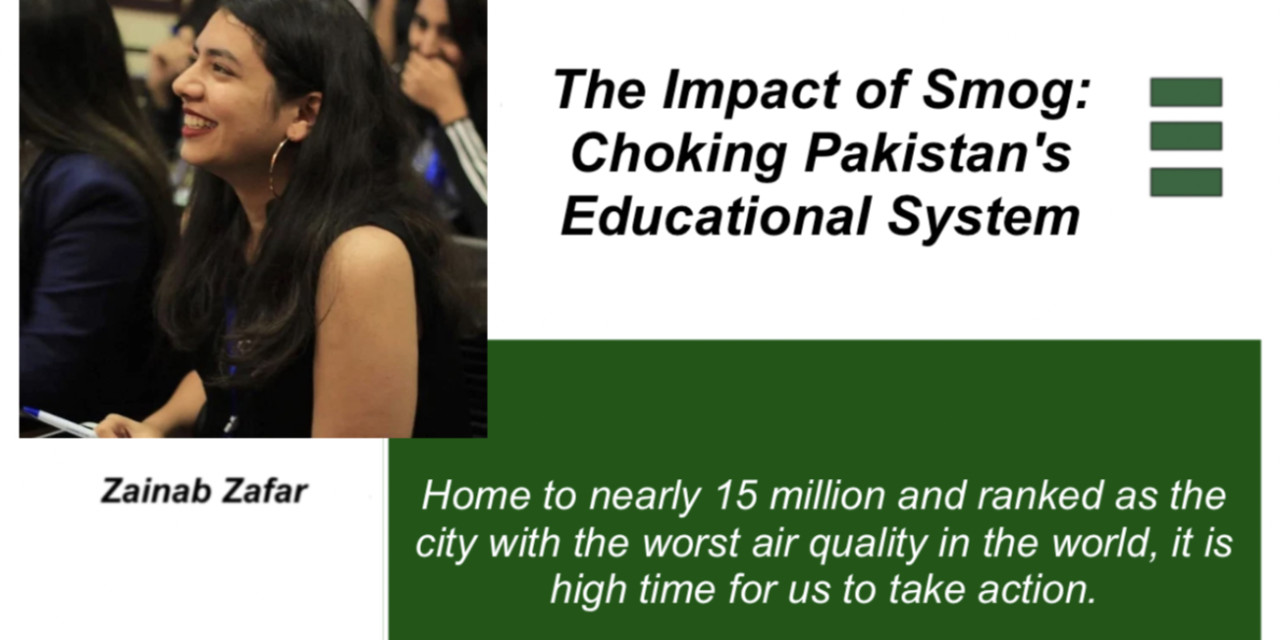Grappling with a severe environmental crisis, smog has taken over Lahore impacting the daily lives of residents. The toxic blend of smoke and fog has not only posed a serious health risk but also affected access to education in the city. The consequences of smog on education, health and environmental damage in Lahore have shown the importance of Pakistan working actively towards meeting the Sustainable Development Goals to ensure basic provisions are not stripped from individuals.
In the past Pakistan has been plagued with school closures over conflict, it is not unfamiliar territory. From the cancellation of board exams due to political unrest and protests, we now face a new tangible threat of climate change towards our educational system.
The smog has led to a surge in respiratory illnesses, with officials reporting a 50% increase in respiratory pediatric cases. It is a dire time for Pakistan to evaluate a myriad of its approaches to tackling the climate crisis. From rapid urbanisation, loss of land, and natural calamities on the rise, the rate at which the population is growing has left no space for the metropolitan city to recover from the toxic built-up smog.
The environmental problem has now seeped into harming the educational system with the closure of schools becoming normalized. What can only be seen as a health hazard, the smog has disrupted schooling and other everyday activities for those residing in Lahore.
Schools across Punjab were shut down twice due to the smog and the rise of eye infections. Loss of education due to closures has been accounted for, yet the bigger picture remains blurry. An increase in respiratory problems in young children, particularly those in low-income brackets and barriers to accessing health care will be impacted in the long run. The long-term effects on their health may hinder them from attaining education as a whole. Similar is the case for a gender-based approach to this loss of education. With routine school closures and increased health risks, it will be young girls who will bear the brunt of this burden. With societal norms in play, keeping in mind the traditional role of women as caretakers and the present negativity towards allowing girls to be educated due to security, safety and lack of free schooling and transport, we will soon see an increased gender gap in our educational system.
Home to nearly 15 million and ranked as the city with the worst air quality in the world, it is high time for us to take action. While the city is choking there remain a multitude of hurdles in its way to contain the problem. With imposed public lockdowns in an attempt to improve the environmental situation and artificial rain being used in certain regions of the city, the problem remains bigger for the poverty-stricken residents of the city. Those who cannot afford to take days off from their work, those who continue to work in informal roles, those who do not reside in areas testing artificial rain, and those who drive to work on bikes, cycles or feet inhaling fumes at all times of the day remain the ones who will also be denied health care when their situation worsens. The first step is recognizing the climate crisis to be a social-justice issue.
For tangible solutions a lockdown is not enough, it is merely a short-term solution beneficial for those who can afford to take time off. A more beneficial approach for us to not only stop the city from choking but get back onto the path to meet Vision 2030 would be to invest in areas such as public transport to lower fumes and be cost-effective. Investment in healthcare is equally important to allow for easy access to facilities as we are a long way from living in a breathable city. Another area to look into is remote or hybrid learning and increasing access to technology. Above all trying to stop our rapid urbanization and focusing on smart city designs is essential, for this, there is a dire need to depoliticise sustainability and development. People being kicked from their homes and squatter settlements over the loss of land only for them to rebuild over and over again has us stuck in a constant loop of construction and adding to our bad air quality.
Our starting point to save our cities from choking is to depoliticise our policy and ensure it is made for the people it affects not the ones sitting at the top.
writer is a student based in Islamabad


